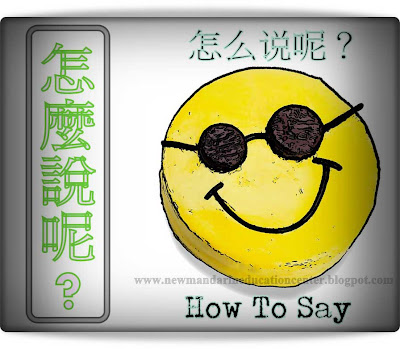Make Sentence 2
造句
造句
相信
Xiāng xìn = Trust
世界上,我只相信妈妈和爸爸。
Shì jiè shang, wǒ zhǐ xiāng xìn mā ma hé bà ba.
In this world, I only believe in mom and dad.
我相信他能办妥这件大事。
Wǒ xiāngxìn tā néng bàn tuǒ zhè jiàn dàshì.
I believe he can handle this major event.
办妥 = to handle well the improper matters.
大事 = big affair; major event.
伤心
Shāng xīn = Sad
不希望别人伤了你的心,就别伤了别人的心。
Bù xī wàng bié rén shāng le nǐ de xīn, jiù bié shāng le bié rén de xīn.
have no wish of others to hurt your heart, so do not hurt the hearts of others.
人伤心悲哀的时候往往吃不下饭。
Rén shāng xīn bēi āi de shíhou wǎng wǎng chī bú xià Fàn.
When people feel sad and sorrow, they tend to eatless.
吃不下 = can not eat anything.
[feel the stomach already full]
伤害
Shāng hài = Damage, hurt
他无意地伤害了她。
Tā wúyì de shāng hài le tā.
He unintentionally hurt her.
请不要伤害别人的自尊心。
Qǐng bú yào shāng hài bié rén de zì zūn xīn.
Please do not hurt other's self-pride.
妄自尊大的态度能伤害别人的心。
Wàng zì zūn dà de tài dù néng shāng hài bié rén de xīn.
Arrogant attitude could hurt the hearts of others.
自尊 = self-pride.[harga diri]
妄自尊大 = ridiculous self-important;
arrogantly think that other should respect him/her but not him/her.
可怕
Kě pà = Terrible, feel scare
坏人常做可怕的事。
Huài rén cháng zuò kě pà de shì.
The bad guys often do terrible things.
小孩会觉得夜晚很可怕。
Xiǎo hái huì jüé de yè wǎn hěn kě pà.
Children will feel terrible of night.
可惜
Kě xí = Unfortunately; what a pity; pity
昨天电影很好看,很可惜,你没有跟我们一起去看。
Zuó tiān diàn yǐng hěn hǎo kàn, hěn kě xí, nǐ méi yǒu gēn wǒ men yì qǐ qǜ kàn.
Yesterday the movies look great, unfortunately, you did not go with us.
学习科学是很好的事儿,但很可惜他不爱学习。
Xué xí kē xüé shì hěn hǎo de shìr, dàn hěn kěxí tā bú ài xüé xí.
Learning science is a good thing, but unfortunately he does not love to learn.
减少
Jiǎn shǎo =
Reduction; become less.
城市里的人越来越多,乡村的人减少了不少。
Chéng shì lǐ de rén yüè lái yüè duō, xiāng cūn de rén jiǎn shǎo le bù shǎo.
The city has more and more people, the village people has diminished a lot.
跟随
Gēn suí = Follow
女朋友跟随男朋友去美国。
Nǚ péng yǒu gēn suí nán péng yǒu qǜ měi guó.
Girlfriend follow boyfriend to go to U.S..
他的帮助减少了我的困难。
Tā de bāng zhù jiǎn shǎo le wǒ de kùn nán.
His help reduce my difficulties.
想办法
Xiǎng bàn fǎ =
Think of better way, find the solution
遇到困难的时候,我们要想办法解决问题。
Yǜ dào kùn nán de shí hou, wǒ men yào xiǎng bàn fǎ jiě jüé wèn tí.
In times of difficulties, we should think of better way to solve the problem.
你要多想办法,事情才能解决好。
Nǐ yào duō xiǎng bàn fǎ, shì qíng cái néng jiě jüé hǎo.
You should have the better solution, so the things can be resolved.
悲伤
Bēi shāng = Sad; sorrow.
他喜欢出卖朋友,令人感受悲伤。
Tā xǐ huan chū mài péng yǒu, lìng rén gǎn shòu bēi shāng.
He likes to betray friend, that make people feel sad.
令人感到悲伤是不好的。
Lìng rén gǎn dào bēi shāng shì bù hǎo de.
To make people feel sad is not good.
小力最喜欢的玩具不见了,心里感到很悲伤。
Xiǎo lì zuì xǐ huan de wán jǜ bú jiàn le, xīn lǐ gǎn dào hěn bēi shāng.
Xiao Li favorite toy was gone, his was very sad.
受肉刑
Shòu ròu xíng =
Subject to corporal punishment
皇帝判了他受肉刑。
Huáng dì pàn le tā shòu ròu xíng.
Emperor sentenced him with corporal punishment.
很久以前,犯了罪的人会受肉刑的惩罚。
Hěn jiǔ yǐ qián, fàn le zuì de rén huì shòu ròu xíng de chéng fá.
in ancient time, people who committed a crime will recieved corporal punishment.
受 = to receive [bad things such disaster, unpleasant things]
告状
Gào zhuàng = To file a lawsuit against someone;
to make a complaint against someone.
他偷了我的东西,我要向警察告状。
Tā tōu le wǒ de dōng xi, wǒ yào xiàng jǐng chá gào zhuàng.
He stole my stuff, I want to report it to the police.
犯了罪的人会被别人告状。
Fàn le zuì de rén huì bèi bié rén gào zhuàng.
One who has committed a crime could be reported by someone.
抱怨
Bào yuàn = Complained
男子汉不可以像女人一样,动不动就抱怨。
Nán zǐ hàn bù kě yǐ xiàng nǚ rén yí yàng, dòng bú dòng jiù bào yuàn.
Man should not be like a woman, easy to utter a complain.
这个男人爱抱怨,就像个女孩子一样!
Zhè ge nán rén ài bào yuàn, jiù xiàng gè nǚ hái zi yí yàng!
This man loves complain, just like a girl!
动不动就 = [easily] sedikit dikit langsung ...
像 = looks like
附近 : nearby
我家附近有一家便利商店
Wǒ jiā fù jìn yǒu yì jiā biàn lì shāng diàn。
Nearby my house there is a convinient store.
里面 :inside
学校里面有一个很大的教室。
Xüé xiào lǐ miàn yǒu yí gè hěn dà de jiào shì。
There’s one big class in school.
外面 :outside
外面有很多人。
Wài miàn yǒu hěn duō rén。
There are many people outside.
前面 : front
走在我前面是我弟弟。
Zǒu zài wǒ qián miàn shì wǒ dì di。
walking infront of me is my little brother.
后面 :back
你后面有谁?
Nǐ hòu miàn yǒu shéi?
Who is behind you?
校园 : campus
我的校园很美丽
Wǒ de xiào yüán hěn měi lì。
My campus is beautiful.

Comments
Post a Comment